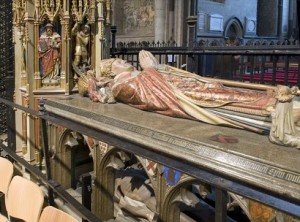Conflict between church courts and state courts begins.
Continuing Becket’s Murder,
our selection from History of England, From the First Invasion by the Romans to the Accession of Henry VIII by John Lingard published in 1819. The selection is presented in ten easy 5 minute installments.
Previously in our series Becket’s Murder.
Time: 1170
Place: Canterbury Cathedral

The contest at last commenced; and the first attack was made with great judgment against that quarter in which the spiritual courts were the most defenseless, their criminal jurisdiction. The canons had excluded clergymen from judgments of blood; and the severest punishments which they could inflict were flagellation, fine, imprisonment, and degradation. It was contended that such punishments were inadequate to the suppression of the more enormous offences; and that they encouraged the perpetration of crime by insuring a species of impunity to the perpetrator. As every individual who had been admitted to the tonsure, whether he afterward received holy orders or not, was entitled to the clerical privileges, we may concede that there were in these turbulent times many criminals among the clergy; but, if it were ever said that they had committed more than a hundred homicides within the last ten years, we may qualify our belief of the assertion, by recollecting the warmth of the two parties, and the exaggeration to which contests naturally give birth.
In the time of Theobald, Philip de Brois, a canon of Bedford, had been arraigned before his bishop, convicted of manslaughter, and condemned to make pecuniary compensation to the relations of the deceased. Long afterward, Fitz-Peter, the itinerant justiciary, alluding to the same case, called him a murderer in the open court at Dunstable. A violent altercation ensued, and the irritation of Philip drew from him expressions of insult and contempt. The report was carried to the King, who deemed himself injured in the person of his officer, and ordered De Brois to be indicted for this new offence in the spiritual court. He was tried and condemned to be publicly whipped, to be deprived of the fruits of his benefice, and to be suspended from his functions during two years.
It was hoped that the severity of the sentence would mitigate the King’s anger; but Henry was implacable: he swore “by God’s eyes” that they had favored De Brois on account of his clerical character, and required the bishops to make oath that they had done justice between himself and the prisoner (A.D. 1163). In this temper of mind he summoned them to Westminster, and required their consent that, for the future, whenever a clergyman had been degraded for a public crime by the sentence of the spiritual judge, he should be immediately delivered into the custody of a lay officer to be punished by the sentence of a lay tribunal. To this the bishops, as guardians of the rights of the Church, objected. The proposal, they observed, went to place the English clergy on a worse footing than their brethren in any other Christian country; it was repugnant to those liberties which the King had sworn to preserve at his coronation; and it violated the first principle of law, by requiring that the same individual should be tried twice and punished twice for one and the same offence. Henry, who had probably anticipated the answer, immediately quitted the subject, and inquired whether they would promise to observe the ancient customs of the realm. The question was captious, as neither the number nor the tendency of these customs had been defined; and the Archbishop with equal policy replied that he would observe them, “saving his order.” The clause was admitted when the clergy swore fealty to the sovereign; why should it be rejected when they only promised the observance of customs? The King put the question separately to all the prelates, and, with the exception of the Bishop of Chichester, received from each the same answer. His eyes flashed with indignation: they were leagued, he said, in a conspiracy against him; and in a burst of fury he rushed out of the apartment. The next morning the primate received an order to surrender the honor of Eye and the castle of Berkhamstead. The King had departed by break of day.
| <—Previous | Master List | Next—> |
More information here.
Leave a Reply
You must be logged in to post a comment.